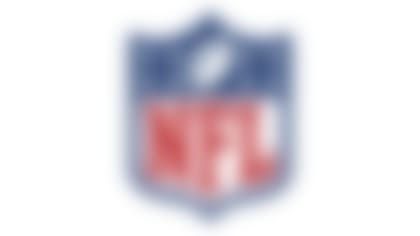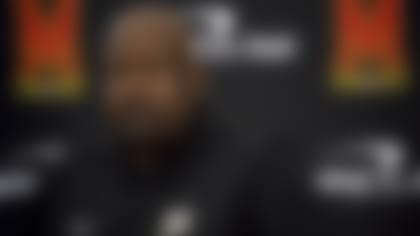AURORA, Ohio -- He sat on the right side of the stage, his loose-fitting dress shirt tucked neatly into khaki slacks detailed with a Louis Vuitton belt and a pair of alligator skin shoes. This is today's portrait of Cincinnati Bengals cornerback Adam Jones.
Is he a changed man? For the record, he says he is. He says he looks back on his recent years of transgressions with disgust and regret, unwilling to appreciate the fun parties that often preceded the "headaches" as he tries to turn his life around.
But that's not why he's here, in a Cleveland suburb, speaking to a roomful of NFC rookies at the NFL's Rookie Symposium -- a gig that Troy Vincent (the league's vice president of player engagement) says Jones literally asked the NFL to let him do. It isn't an attempt to convince the world that he's changed.
Instead, he says, it is an attempt to convince a room to avoid his path.
"I wouldn't want any of those guys to go through what I've gone through," Jones told NFL.com "It's not fun being on the news everyday for this mistake or that mistake because your boy did this or you did that. At the end of the day, my oldest girl is six right now, and she can read. She can type my name into a computer. You don't want her to see all of those negative things."
Jones would not allow the NFL Network or NFL.com (the only media platforms currently in attendance at the rookie symposium) to view his discussion with the rookies, and he originally was reluctant about conducting any interviews. He wanted this to be between he and them.
Afterward, he did eventually open up.
"I don't remember too much from my (2005) rookie symposium because I didn't pay attention," Jones said. "That was a problem -- and it probably would have helped me out with a lot of situations I've been in."
Feel free to choose any number of "situations" to understand what Jones -- who still prefers to be called Adam instead of "Pacman" these day -- is talking about.
Only 10 days ago, a Nevada jury found Jones civilly responsible for injuries in a 2007 Las Vegas shooting that left one man paralyzed.
Although Jones was not the shooter, his actions at a strip club leading up to the incident caused a judgment that he owes the victims $11.65 million.
Jones' attorney has said he'll appeal the penalties, but the damage of that incident has undoubtedly already resulted in plenty of problems for Jones, including his eventual exit from the Cowboys in 2009.
He wouldn't discuss the case specifically, but in generalities, Jones made it clear Monday he understands that he put himself in terrible situations.
Darlington: Don't be like Mike
Michael Vick has a very simple message for NFL rookies: Don't follow in my footsteps. Jeff Darlington reports. **More ...**
"I brought myself back to earth," Jones said. "I shed everything, and I got back to the people who have gotten me this far. That's not the way I want to live. I wouldn't put my reason for changing on anyone except myself."
So what moment does he regret the most from the past several years?
What situation causes him to look back on his past and ask himself, "Who was that person doing that?" It actually wasn't the Vegas incident at all. Instead, he said it was a meeting with Commissioner Roger Goodell that same year (2007) about his off-field behavior.
The night before he met with Goodell, a meeting that led to a one-year suspension for conduct detrimental to the league in the wake of 10 incidents that caused police to question him, Jones went to a strip club.
"That was probably the stupidest (expletive) decision I ever made in my life," said Jones, shaking his head and staring off. "It was just stupid. I went up to meet the commissioner after some more stuff. The night before I met him, I went out. I didn't do anything -- just went to get something to eat. But I was at a strip club.
"I stayed there for 10 minutes, and he knew."
Jones said he didn't share stories as specific as that one to the rookies. He did share general messages with all of them about the trouble that his decisions got him into.
"If I could tell them anything, I just want them to realize this is a business. When you sign your contract, you are the head CEO of your company. The Adam Jones Company -- whatever it is. We can't go running down a field for the rest of our life.
"Every decision you make is critical. It might not get you now. But it will get you later."
In another room seven years ago, at this same rookie symposium held in a different city, Jones was in a similar audience listening to all of the warnings. But he wasn't paying attention. He wasn't applying those lessons to his own life.
Now, he hopes his own past -- one that was extremely well known by every rookie in that room -- can change the future of someone just like him so they don't make the same mistakes he did.
When Jones finished his speech Monday, Seattle Seahawks linebacker Bobby Wagner waited for the room to empty before jumping onto the stage to speak privately for a few extra minutes with Jones. He'd never met him before, but something during his speech triggered a desire to seek advice.
"He was going through something that I was going through, so I asked him personally what he did so I can try to apply it to my life," said Wagner, who said the matter was too private to discuss during the interview. "It helps knowing that somebody went through what you went through. You can take what you need from it and apply it to your life.
"A lot of players in here are going through some of the same things, whether its baby mamas or trying to pick a financial advisor to an issue with an agent. We can learn from this. We can learn from him."
Is Jones a changed man? On Monday, it didn't matter. It only mattered whether he was capable of changing other men before they choose a wrong course.
"Hopefully," Jones said, "somebody got something out of it."
Follow Jeff Darlington on Twitter @jeffdarlington











